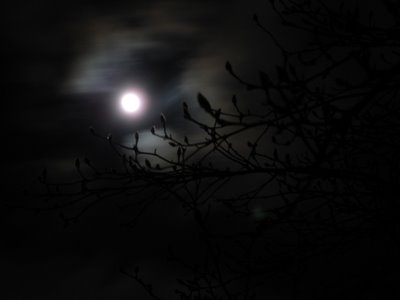Twinkle gaspingly, like fiery fish out of water.
Weather has been erratic here once again today. I awoke to bleary sun, the kind of washed out sun that tells you rain's on its way soon, and within a couple of hours, the rain was coming down so hard and fast that it left enormous pools of standing water in half the lawns on my street--pools that glinted and rippled with loveliness when the sun came out and the breeze kicked up about an hour later. As I sat on the couch reading yet more student writings, I watched the clouds alternately blazing and dulling past. At their best, the clouds came past in multiple layers and at multiple speeds: a stable, thickish body of cumulus fronted by thready wisps (which I would call cirrus, but I think those only occur higher in the atmosphere) slipping past at lower altitude. Round about 6 p.m., as I took advantage of a lull before dinner to order my textbooks for next fall's courses (yes, already; now is when it happens), I realized that the light had gotten mighty strange. The sun seemed to have gone down, but everything was illuminated as though it were just low. Turning to look over my left shoulder, out the small window that forms one end of my living room's bay, I realized that an enormous cumulonimbus cloud was climbing up over the sky from the south and southwest. The cloud was edged in gold remnants of sunlight, though I didn't see the sun again.
Fifteen minutes later, I looked up from my book-ordering to see not only that the huge thunderous looking cloud that I had expected to start dropping more rain on us any second had not done so but also that the setting sun had turned the wisps and contrails in the sky to rose. "Red sky at night, sailor's delight," I found myself whispering to myself as I grabbed the camera and ran out the back door (squelching down into the still sodden lawn).

When I was little, my parents taught me basic weather legends: "Red sky at night, sailor's delight; red sky at morning, sailors take warning." "The rain in Spain falls mainly on the plain." That one occasioned some confusion, because I was a punster even at an early age and envisioned the rain falling on the kind of plane that would periodically take my father off to Cleveland or Detroit on business. Why, in Spain, would the rain fall mostly on the airplane? I have a clear memory of sitting with my father in our family room, in the late afternoon, while he explains the differences not just between "plane" (=airplane) and "plain" (=geographic entity) but also between "plane" (=airplane) and "plane" (=geometric entity). He then goes on to explain spheres, using the example of an orange as a spherical object. I am probably four. I love my father. He is also the person who taught me the phrase "superficial flesh wound" when I scraped my knee at age two. "Did you get a boo boo?" the neighbor asked. "No," I said reassuringly, having myself been reassured by my father as he cleaned and bandaged the injury. "It's just a superficial flesh wound."
He's also the person who taught me how to remember that the sun sets in the west, with another set of rhymes: "Sun sets in the west, fishing is best. Sun sets in the east? Fishing is least." "But the sun doesn't go down in the east, Papa," I said when he taught me these lines. (In my memory, all these meterological lessons happened on the same afternoon.) "That's right," he said. "So, if the sun were setting in the east, it would mean that it was the end of the world, and I think the fishing would be least, then." One could rarely argue with my father.
Based on the small quantity of red in the sky tonight, I'd say that any mid-Ohio sailors should be thinking life is good when the sun comes back up tomorrow. Those of you familiar enough with mid-Ohio's geography to know just how landlocked we are will already have picked up the wryness in my tone.
When I left for dinner (an absolutely exquisite rendition of keema peas, a hearty dish made with lamb and peas, served over rice), it was nearly dark; lightning backlit the heavy clouds that continued hanging about just behind the treeline. And it was about 67 degrees. By the time I left my friends' house to come home, the wind had picked back up, and it was about 47 degrees. The sky had turned to one of my favorite versions of itself: fast-moving clouds brilliantly lit by and intermittently obscuring an almost-full moon, stars tiny and visible in swiftly disappearing patches. Usually, when confronted with a lovely night image, I own up to its fleetingness and do my best to impress it on myself. Tonight, I decided to give my tripod a shot, as it were. This image is my favorite, largely for the weird way my tulip magnolia tree came out looking (and let me tell you--as if you weren't already waiting for spring, wait until you see this tree in bloom):

I also tried to get a good shot of my lightning rod, but I wasn't quite as successful there. I can see what I'm looking at in the picture, and with the help of my photo editing program, I hope you'll be able to see it, too.
 All these images of blustery moonlight and changeling weather are entirely germane to what I'm working through tonight: I'm about to embark on the last installment of Dickens's Bleak House, which my evening seminar and I will finish up a week from tonight. Bleak House is one of many novels Dickens published in twenty numbered parts, one part published each month, each part consisting of 32 pages and two full-page illustrations. (Dickens was not, though you may have heard this legend, paid by the word.) The last installment of these twenty-part novels comprised parts nineteen and twenty--it was a sort of two-hour finale, if you will--as well as helpful things like a table of contents and title page for the full novel, in case you'd been buying the individually bound parts for nineteen months and found yourself wanting to get them all bound up together as a book. The installment I'm about to read was published in September 1853, by which time people had been reading Bleak House--silently and aloud, individually and in groups--since March 1852. I try to get my students to imagine the kinds of anxiety and relief that this novel's first readers must have felt--the ways these novels really lived with them for months on end, could settle in and make them wonder, make them talk and speculate and cook up possible plot continuations. (Sometimes, in an early version of fan fiction, people went ahead and pirated continuations of Dickens novels, while they waited for the new installments to come out. Dickens, as you might imagine, was not so amused.) (And in at least one instance, legend has it, people in New York City got so crazed with desire to find out what had happened to a particular ailing character in a particular early Dickens novel that, when the ship arrived from London bearing the latest installment, someone had to read that installment aloud, at the docks, to prevent the assembled crowd from rioting. I've never wanted to hunt that legend down and make sure it's true, because as a story it's just so wonderful. "Is Little Nell dead?!" the people shriek. A reading ensues. Mass weeping and wailing. Who bought the installment after that, I've always wondered? Did people think of it as a souvenir of the collective experience they'd just had?)
All these images of blustery moonlight and changeling weather are entirely germane to what I'm working through tonight: I'm about to embark on the last installment of Dickens's Bleak House, which my evening seminar and I will finish up a week from tonight. Bleak House is one of many novels Dickens published in twenty numbered parts, one part published each month, each part consisting of 32 pages and two full-page illustrations. (Dickens was not, though you may have heard this legend, paid by the word.) The last installment of these twenty-part novels comprised parts nineteen and twenty--it was a sort of two-hour finale, if you will--as well as helpful things like a table of contents and title page for the full novel, in case you'd been buying the individually bound parts for nineteen months and found yourself wanting to get them all bound up together as a book. The installment I'm about to read was published in September 1853, by which time people had been reading Bleak House--silently and aloud, individually and in groups--since March 1852. I try to get my students to imagine the kinds of anxiety and relief that this novel's first readers must have felt--the ways these novels really lived with them for months on end, could settle in and make them wonder, make them talk and speculate and cook up possible plot continuations. (Sometimes, in an early version of fan fiction, people went ahead and pirated continuations of Dickens novels, while they waited for the new installments to come out. Dickens, as you might imagine, was not so amused.) (And in at least one instance, legend has it, people in New York City got so crazed with desire to find out what had happened to a particular ailing character in a particular early Dickens novel that, when the ship arrived from London bearing the latest installment, someone had to read that installment aloud, at the docks, to prevent the assembled crowd from rioting. I've never wanted to hunt that legend down and make sure it's true, because as a story it's just so wonderful. "Is Little Nell dead?!" the people shriek. A reading ensues. Mass weeping and wailing. Who bought the installment after that, I've always wondered? Did people think of it as a souvenir of the collective experience they'd just had?)I can't even bear to bring this post to a graceful ending, now that I'm thinking about how the novel will end. Even though I've read this one before, and even though I'm through the part that wrenches my heart mercilessly, my readerly desire is getting the better of me.


0 Comments:
Post a Comment
<< Home